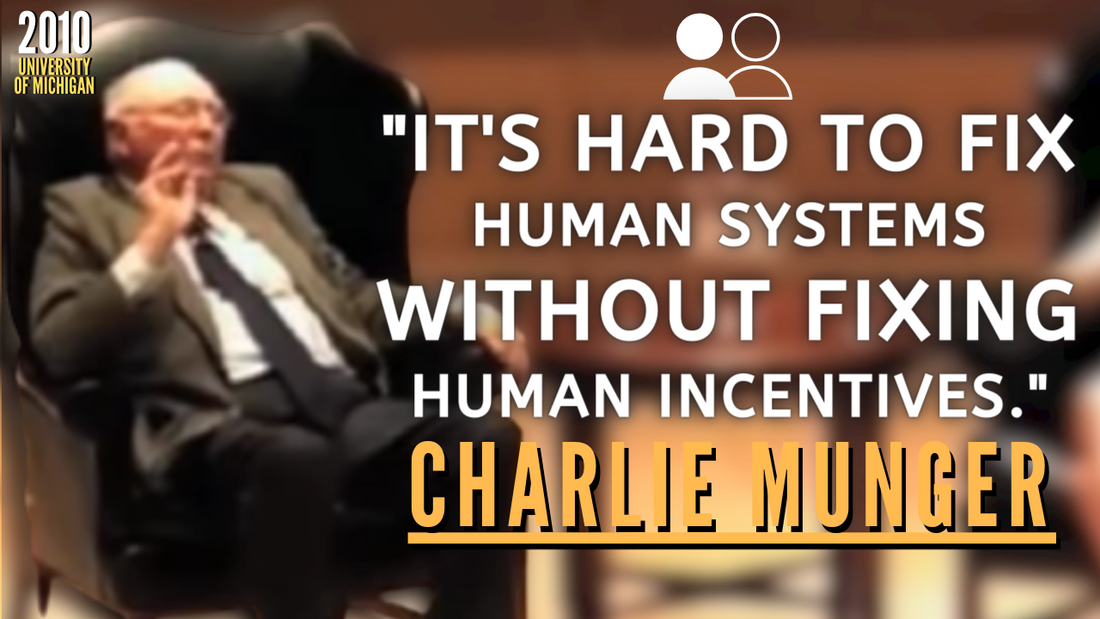
Charlie Munger: How Incentives Shape Behaviour? | University of Michigan 2010【C:C.M Ep.193】
[Transcript]
AUDIENCE MEMBER: Charlie, a lot of the problems that we've been discussing so far from Wall Street to these bigger long-term energy initiatives and politics even are rooted in the fact that our country set up on short term incentive system, managers are always looking at what their earnings are going to be next quarter at the top of companies, politicians are always looking at what the next political point is going to score and then setting programs to develop well past their term in office.
How do you propose to get past that and to shift our system from the short-term incentives and planning to a more long-term perspective not just in our focus, but in how we act as well?
CHARLIE MUNGER: Well, of course, we have a terrible problem with these very short-term incentives. And if you combine short-term incentives with a very little moral reticence, of course, you have a problem and it's hard to fix human systems without fixing human incentives.
So you're absolutely right to focus on the incentives. And I think the existing system as its evolved is quite perverse. A system is perverse when good people go bad because of the way the system is structured.
If you run a big chain of stores and you make it easy to steal by your own sloppiness, you will cause a lot of good people to go bad. You will have created an irresponsible system and a system with these irresponsible incentives, of course, it's geared to cause trouble and you point out that a dozen has.
And if I were [inaudible] I would change the whole system but nobody's going to do it Munger style. And you people young people are going to have to live in at the way it is and attack it piece by piece, but you were right that is a very serious problem both for the politicians and for the executives and everything else.
I don't think it is required because the rest of the world cares terribly about the next quarter's earnings, Berkshire doesn't care. So listen everybody that cares, now, you can say we carefully structured our system on our lives so that we didn't have to be under crazy incentives.
I do not trust myself well enough and I behave better than most, have a lot of perverse incentives on myself to do bad things. Much better to set yourself up so that the temptations are low.
And so, yes, we should structure the system differently. I don't think it works at all to pay the directors a lot of money and write a big long thing like Sarbanes-Oxley. The more you pay the directors, the more they'll pay the CEO, the ordinary rules of social psychology require that result.
BECKY QUICK: And at Berkshire you pay directors nothing?
CHARLIE MUNGER: Practically nothing, right. Because we don't like the culture. So it's our quiet form of rebellion, we say we examined your procedures and everybody's out of step but Charlie.
It's like the old story about the man who's out on the freeway and the wife looks and she says, oh my god, she calls him on the cell phone and she says, oh, it's terrible, there's a car going the wrong way on the freeway. And the guy answers, a car he says there are thousands of them. (Laughter)
Well, [inaudible] everybody's out of step but Charlie, and but I think we should change all these incentives, but I don't think the nostrums that we're using are going to change things. Enough to put in your eye.
(Source: https://youtu.be/Pph3Bg8Pihg)
[YAPSS Takeaway]
So listen everybody that cares, now, you can say we carefully structured our system on our lives so that we didn't have to be under crazy incentives. I do not trust myself well enough and I behave better than most, have a lot of perverse incentives on myself to do bad things. Much better to set yourself up so that the temptations are low. ~Charlie Munger
